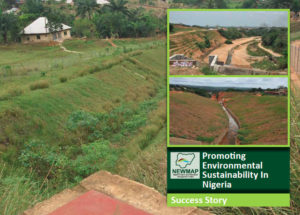The Nigeria Erosion and Watershed Management Project (NEWMAP), in collaboration with the World Bank and South-South Knowledge Exchange (SSKE), held a 3-day Knowledge Fair to mark the 2017 World Space Week with the theme: Exploring New World in Space: Challenges and Prospects for Nigeria, from Wednesday, 4th to Friday, 6th October, 2017 at the Sheraton Hotel, Abuja. The event was attended by officials of the World Bank, International Partners from India and China, the National Assembly, NEWMAP, National Space Research Development Agency (NASRDA), Government Ministries, Departments and Agencies (MDAs), academia, media, National Youth Service Corps Members, students and relevant stakeholders.
Background: The World Bank task teams secured financing from the China-World Bank Group Trust Fund of USD 433,000 over 2.5 years to enhance South-South knowledge sharing between China, India, and Nigeria. The Trust Fund is supporting important knowledge sharing and learning between China, India and Nigeria, focusing on infrastructure development associated with major land and gully restoration, agricultural development and climate smart agriculture on restored lands, and applications of remote sensing, GIS, and Decision Support Systems (DSS) for more effective project management and M&E. These activities would primarily benefit the outcomes of the Nigerian Erosion and Watershed Management Project (NEWMAP), the new Neeranchal National Watershed Project in India and the FADAMA project in Nigeria.
The conference focused on technological developments in earth observation that is crucial in addressing environmental issues and watershed management towards sustainable development. The potential geospatial technology and capabilities of a Burvhan to harness a wide range of earth observation systems including unmanned aerial vehicles (UAV), systems and sensors to generate data and its processing was highlighted. And participants believed that data’s generated could assist immensely in the management of agriculture, ecosystems, resources and biodiversity, wetlands, coastal and marine.
In summary participants agreed that optimization, utility and sustainability of remote sensing and geospatial technology lies in having a critical pool of technical personnel who are skilled to take advantage of the growing technology.
Spatial data is increasingly available from a range of sources, and increasingly very apt to managing the environment for sustainable development. While substantial efforts have been invested in bridging science and policy, significant gaps still exist in the Nigeria context, therefore there is the need for a more level playing ground to discuss a working national policy on the utility of science for accelerated development.


